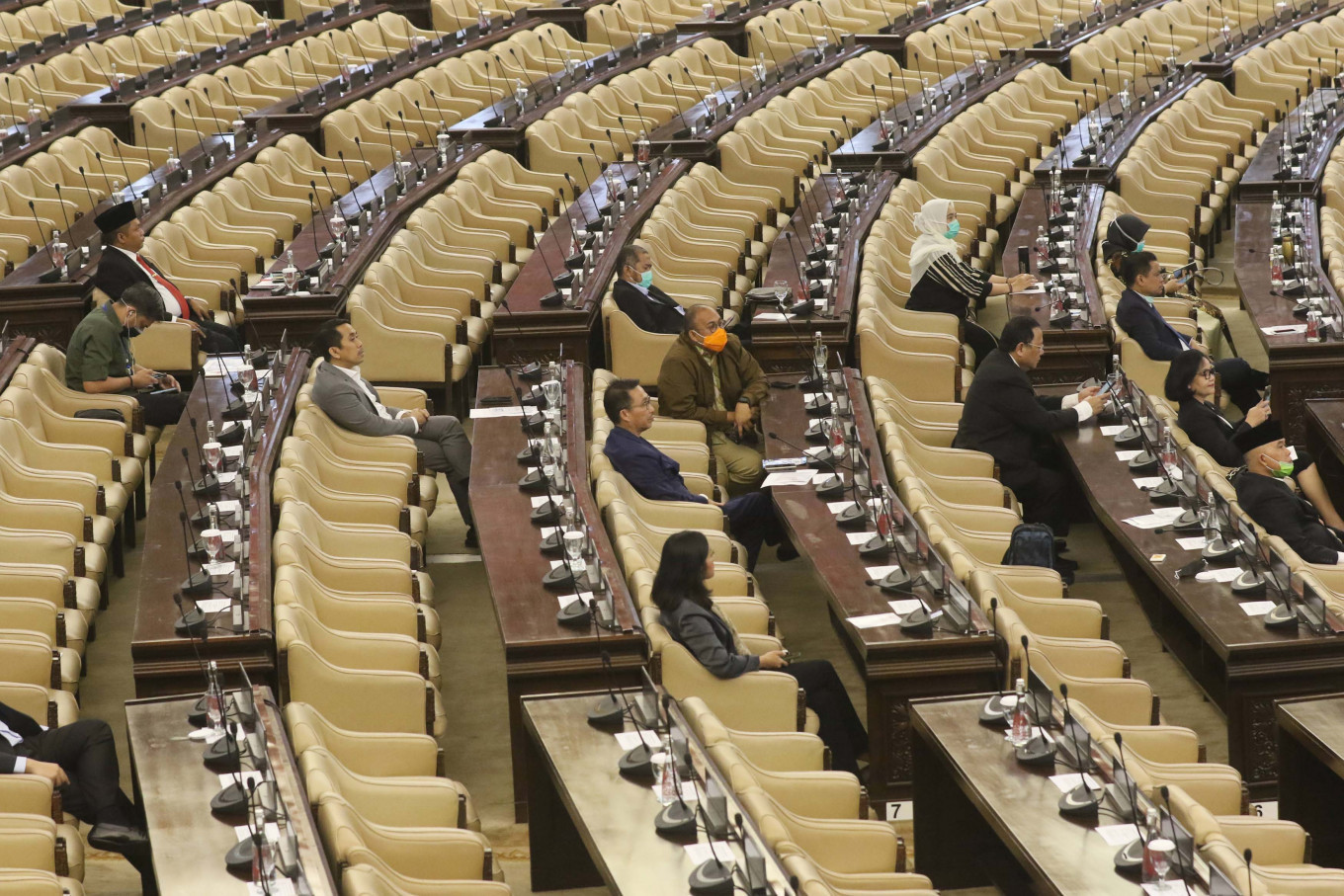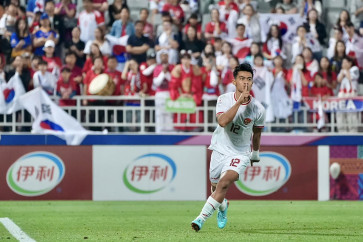Now not the time for 'blame game': House calls for global cooperation over pandemic
The House of Representatives in Indonesia has called on the governments of other countries to actively promote international cooperation and fulfill their role in assisting governments amid the coronavirus pandemic.
Change Size
 A plenary meeting at the House of Representatives building in Senayan, Central Jakarta, takes place with few participants on Monday, March 30, 2020. (JP/ Dhoni Setiawan)
A plenary meeting at the House of Representatives building in Senayan, Central Jakarta, takes place with few participants on Monday, March 30, 2020. (JP/ Dhoni Setiawan)
T
he House of Representatives has called on the governments of other countries to actively promote international cooperation and fulfill their role in assisting governments amid the coronavirus pandemic.
In a webinar on Tuesday, the House’s Inter-Parliamentary Cooperation Committee chairman, Fadli Zon, emphasized the importance of globally coordinated action to overcome the global health crisis that has affected over 200 countries and territories.
The Gerindra Party politician said the world needed coordinated efforts in various domains including the delivery of health assistance, the development of global health policy and financial relief.
“The pandemic might have changed the global landscape, but multilateralism should remain at the core of cooperation,” he said in the webinar, which was also attended by representatives of Malaysia, Vietnam and South Korea.
Fadli, who is also a lawmaker at House Commission I overseeing foreign affairs, said that now was not the time for a "blame game" between global stakeholders, including international organizations that provided countries with platforms through which to cooperate.
He raised concerns over a recent move by the United States government to halt funding to the World Health Organization, saying the decision could disrupt the urgency of global cooperation to address the pandemic.
“As the promoter of the UN resolution on global solidarity to fight COVID-19, Indonesia's [House] reaffirms support to the WHO, especially during the time of the pandemic,” Fadli said.
Read also: Indonesia calls for ‘collective response’ as UN passes COVID-19 resolution
“The WHO remains pivotal in providing advocacy in scientific information and guidelines to contain and mitigate COVID-19. Parliaments should be at the forefront to provide such support.”
On the same occasion, WHO representative for Indonesia Navaratnasamy Paranietharan said the exchange of best practices and research findings among countries could help battle the virus. He also talked about the importance of maintaining the global supply chain for medical equipment and collaborating over the procurement of test kits and vaccine research.
“Readiness is the key to detect and combat the spread of the new coronavirus. Sharing best practices is deeply critical as we still have a lot of gaps. Testing is the key and laboratories are [going to be] the game-changer in this response,” he told the audience at the one-hour long webinar.
Countries around the world, including Indonesia, have been ramping up efforts to clamp down on the coronavirus, which as of Tuesday had infected more than 2.4 million people around the world and killed over 170,000, according to the data compiled by Johns Hopkins University.
In Indonesia, some regions hit hard by COVID-19, such as Greater Jakarta, imposed partial lockdowns to restrict people's mobility with the hope of flattening the curve of the virus.
Other countries, including Malaysia, Spain and Italy, imposed nationwide quarantines
Read also: Avoiding quarantine will inflict greater economic harm, says survey
Stringent measures have already benefited several countries. Three months after reporting their first cases, Hong Kong and South Korea have shown great strides in recovering, giving the world hope that there is an end in sight to the pandemic if the proper measures are taken.
Hong Kong on Monday reported no new infections for the first time in nearly two months, while South Korea announced on Sunday it had hit a two-month low of just eight additional infections, South China Morning Post reported.
The head of the South Korean National Assembly special committee for COVID-19 response, Kim Jin-pyo, shared three important lessons from South Korea’s success in containing the outbreak during the webinar on Tuesday.
The lessons included aggressive and massive testing in the early stages of virus detection, citizens' willingness to voluntarily self-quarantine and transparent information from the government to the people.
“The support of the legislative body is vital,” Kim said, adding that the first step a government could take is to revise bills in order to slow the spread of disease.









